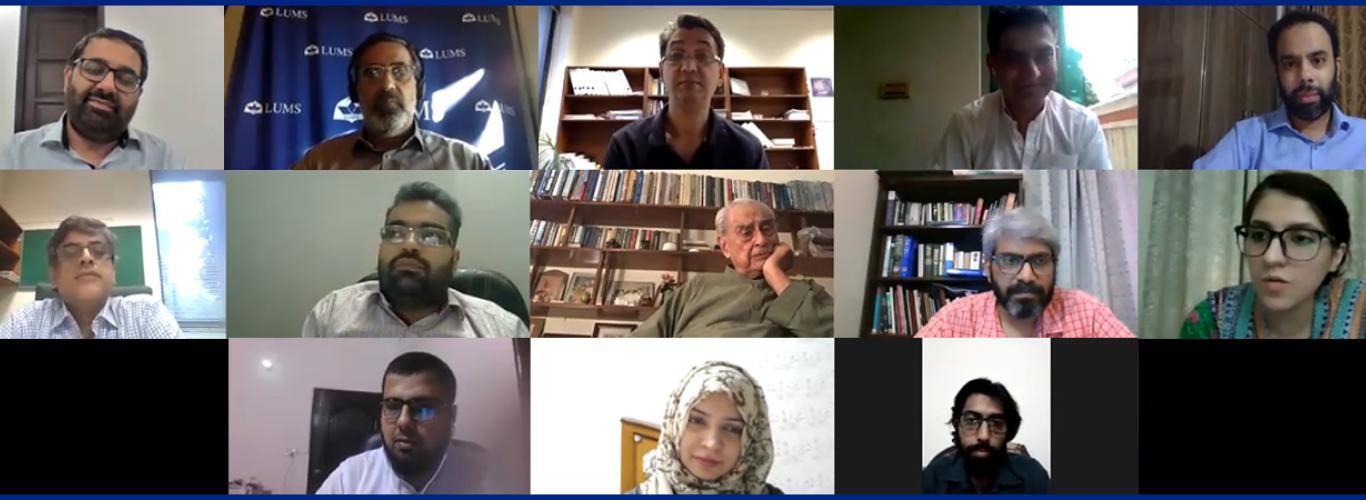Winners of the Syed Babar Ali Research Awards Celebrated
The Syed Babar Ali School of Science and Engineering (SBASSE) at LUMS recently announced 4 PhD students as inaugural winners of the Syed Babar Ali Research Awards. The award recognises potentially high-impact work being carried out by current PhD students at SBASSE, and is sponsored by the Babar Ali Foundation.
To celebrate the inaugural cohort, a celebration was held on Zoom where the four winners had a chance to present their research to Syed Babar Ali, Founding Pro Chancellor, LUMS. Also in attendance were Dr. Arshad Ahmad, Vice Chancellor; Dr. Sabieh Anwar, Dean SBASSE and the different supervisors involved in helping the researchers.
Dr. Anwar explained the process of choosing the four winners, “The awardees were selected after a multi-tiered, rigorous review process which started off at the departmental level. The candidates were then evaluated and assessed at the school level, and then there were marathon presentations by these students.”
The Fellows presented details of their research, after which Syed Babar Ali asked them follow-up questions.
Amina Qadir, a PhD Biology student, spoke about how her research focuses on the discovery of inhibitors against the Hepatitis C virus (HCV). “HCV is one of the most prevalent diseases in Pakistan, and the intended outcome of my project is to provide new potential therapeutics against it. I have been working under the supervision of Dr. Syed Shahzad Ul Hassan and I am thankful to him for always helping and guiding me,” she explained.
The other three PhD students belonged to the Electrical Engineering department.
Abdul Rahman Aslam praised the cutting-edge research facilities at LUMS, and how they facilitated his research. He shared how his research would help people with autism, “My research focuses on the design and analysis of chip-based solutions for the symptoms of autism in autistic people, based on their emotion. I would also like to thank Dr. Awais Bin Altaf, who enabled me to compete for, and win this award.”
Faiza Iftikhar shared how the encouragement and support she received at LUMS allowed her to conduct her research, as the University also offered day care facilities for her daughter. Ms. Iftikhar also explained the importance of her research, “I work on building optical sensors that will be built using resources available in Pakistan. State-of-the-art fabrication facilities are not available here, so the alternative is to send the models abroad for fabrication purposes. My research will make cheap, ultra-sensitive sensors that can be used to test different substances and liquids at home instead of going to a lab. I would like to thank my advisor Dr. Imran Cheema, who has helped me out in the whole process, and has guided and encouraged me to participate in this award.”
Adeem Aslam shared that he is working on different research projects and was supported by the research oriented environment at the University. “What I love about LUMS is that it has a very conducive environment for carrying out multidisciplinary research. I am working under the supervision of Dr. Zubair Khalid, and the end goal of my research is to develop novel signal processing techniques for applications in cosmology.”
All the researchers extended their thanks to Mr. Ali for the opportunity and said it was a great honour and privilege to be selected.
Mr. Ali praised the diversity of the winners, and noted that any PhD programme is incomplete without the experience of meeting people from different backgrounds and other international institutions. "You need to continue your research so that your skills and knowledge do not remain incomplete.”
He encouraged the researchers to work for the betterment of society. “Another dimension of research at LUMS is that we share new knowledge and opportunities with our young minds so that Pakistan ultimately benefits. I am a great believer that research has to have an objective and should ultimately benefit society.”
He suggested that talented students in the Masters and PhD programmes be encouraged to have structured tutorials and make them mandatory for all students at SBASSE, so they can interact with each other in a more informal environment. “The more you teach, the more you learn,” he advised.
Dr. Arshad Ahmad also lauded the researchers for their work. “What fantastic examples of discovery, research, incubation of knowledge and real-life applications. All of these areas hold immense potential as programmes of research and change. My sincere congratulations to all award winners, and special thanks to Babar Sahib for his unwavering support which will multiply and affect the lives of so many.”
Dr. Ahmad also praised the supervisors for their guidance and support and expressed his delight at the diversity of the research undertaken by the winners.























